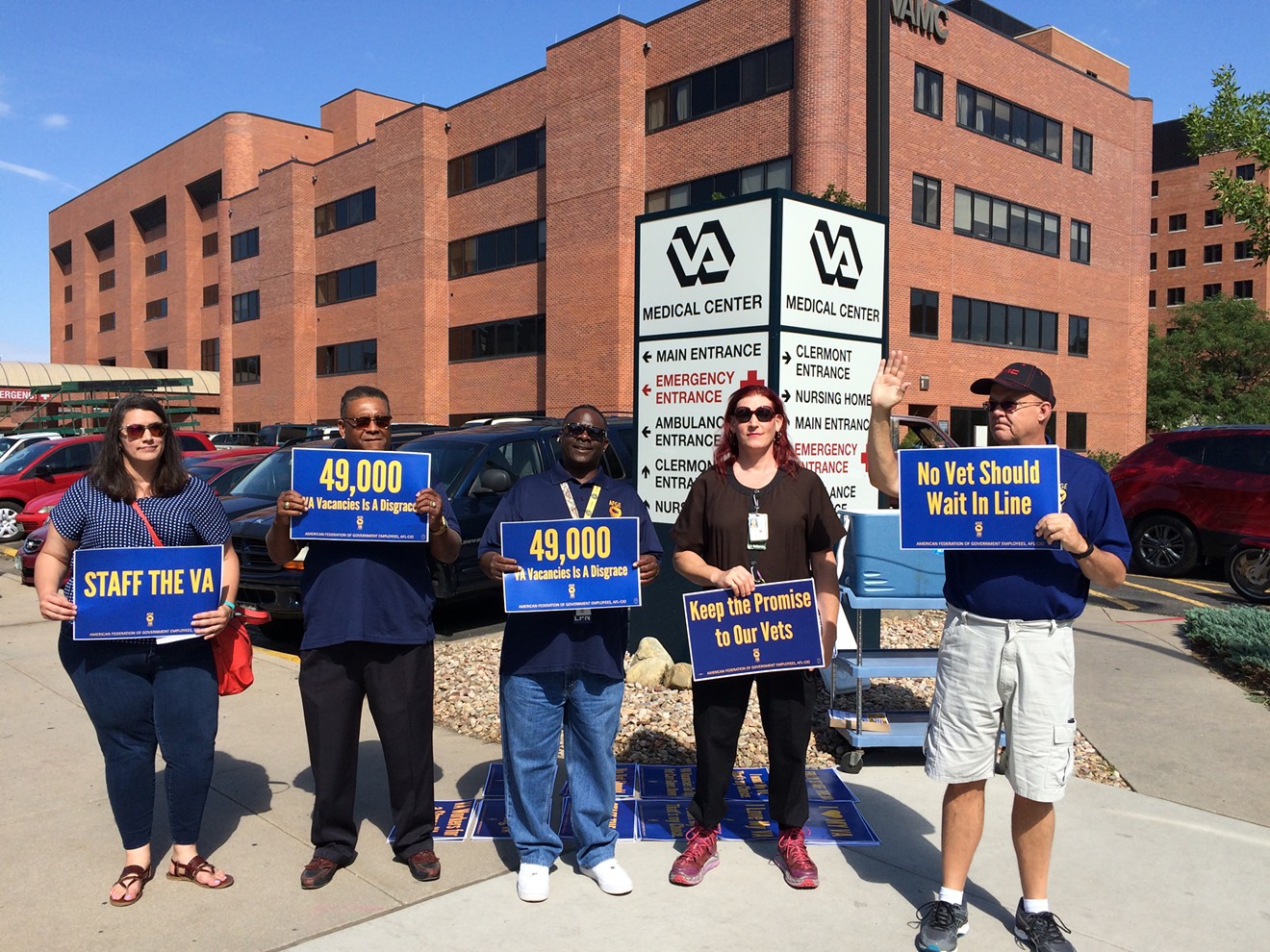Leadership and staff at the Denver Veterans Medical Center gathered on Wednesday, August 23, to draw attention to what they are calling chronic understaffing in not only their Veterans Affairs (VA) hospital, but others around the state and country.
Among those protesting outside of the hospital on Claremont Street and Ninth Avenue was Bernard Humbles, a longtime VA hospital employee and president of the local chapter of the American Federation of Government Employees (AFGE) labor union chapter, the largest union for federal government employees in the country. He says that there are nearly 600 vacant positions in the hospital, from clinical staff such as doctors and nurses to administrative and support positions — leaving employees overworked and veterans with longer wait times to get treatment.
"Our employees are becoming very frustrated," says Humbles. "I've had some that just say 'I'm done,' and leave because of the overwhelming workload. We need to fill these positions. You've even got employees using sick leave, saying, 'I need a day to get some rest.'"
Humbles, who himself served in the Army for twenty years before coming to the VA hospital in 1994, says that the burden comes down on veterans: When he can't find enough employees to fill positions, the staff members he does have must fill the gaps themselves. That can affect both the ability of the VA to see patients, leaving longer wait lists, and the quality of the treatment they receive.
The Denver Veterans Medical Center is funded by the U.S. Department of Veterans Affairs, which is charged with providing benefits like pensions, medical and mental-health treatment, and education assistance to those who have served in the armed forces.
A veteran at the hospital who wished to remain anonymous says that he has received treatment from VA hospitals in four states over 25 years and had some of his longest wait times at the treatment center in Denver.
"Oh, yeah, it's always been underfunded," says the veteran, who is diabetic. The man is moving out of Denver because of the increased price of living, even though he uses marijuana for his anxiety.
But another veteran, Ron Conlin, who served in Vietnam, says that he has never had any problems at the hospital. Conlin was at the hospital to get his teeth checked. "I've always been taken care of here, always got what I needed," says Conlin. "Look, the only time that it's difficult to get in is when you get sick and go to the emergency room, and then it's two or three hours, which is probably typical of anywhere."
The rising cost of living in Denver is problematic for staff, says Humbles, because the VA salary pales in comparison to that of private hospitals.
"Last year we got 800 new employees, okay — and 600 of ’em left," he says. "Part of the problem is pay here. The cost of living has skyrocketed. And then our competitor out here, Kaiser, is offering our people more money to come work for them. And right now employers are going to go where the money is at, because of the high cost of living."
And the problem isn't just at the Denver VA center, he says: Nearly 50,000 jobs at VA hospitals are unfilled, burdening the entire system.
In order to fix the problem, Humbles calls for more funding from the federal government and resources devoted to immediately filling the positions. He's also working with local colleges to fill nursing positions with recent graduates, and is optimistic that the problem can be solved with the two approaches. But he also explains that, without regular citizens being concerned about the treatment that veterans receive, things are hard to change.
"The average citizen needs to call their congressman or congressperson or senators and let them know: We need to staff the VA, we need to fund the VA, and we need to make this system work," says Humbles. "And it can work, if you have the right people doing the job."
Senator Cory Gardner, who recently co-sponsored legislation that protects employees calling attention to problems within the VA, did not respond to Westword's request for a comment on the VA staffers' concerns. In May, the Trump administration budget proposed a $4.4 billion increase in funding for the VA, and set aside $13 billion for treatment in private hospitals outside of the VA system. The proposed budget request is twice as large as the department's spending in 2001, before the wars in Iraq and Afghanistan.
[
{
"name": "Air - MediumRectangle - Inline Content - Mobile Display Size",
"component": "12017618",
"insertPoint": "2",
"requiredCountToDisplay": "2"
},{
"name": "Editor Picks",
"component": "17242653",
"insertPoint": "4",
"requiredCountToDisplay": "1"
},{
"name": "Inline Links",
"component": "18838239",
"insertPoint": "8th",
"startingPoint": 8,
"requiredCountToDisplay": "7",
"maxInsertions": 25
},{
"name": "Air - MediumRectangle - Combo - Inline Content",
"component": "17261320",
"insertPoint": "8th",
"startingPoint": 8,
"requiredCountToDisplay": "7",
"maxInsertions": 25
},{
"name": "Inline Links",
"component": "18838239",
"insertPoint": "8th",
"startingPoint": 12,
"requiredCountToDisplay": "11",
"maxInsertions": 25
},{
"name": "Air - Leaderboard Tower - Combo - Inline Content",
"component": "17261321",
"insertPoint": "8th",
"startingPoint": 12,
"requiredCountToDisplay": "11",
"maxInsertions": 25
}
]












